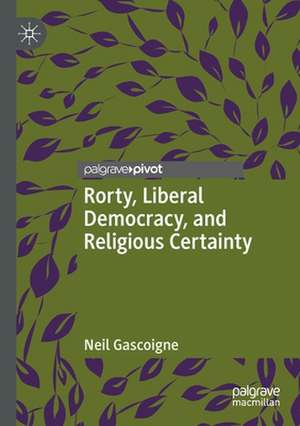Rorty, Liberal Democracy, and Religious Certainty
Autor Neil Gascoigneen Limba Engleză Paperback – 9 aug 2020
The starting point for this exercise in what Rorty calls ‘Cultural Politics’ is an acknowledgement that one must appeal to both secularists and those with religious commitments. In recent years ‘reformed’ epistemologists have aimed to establish a parity of epistemic esteem between religious and perceptual beliefs by exploiting an analogy in respect of their mutual vulnerability to sceptical challenges. Through an examination of this analogy, and in light of Wittgenstein’s On Certainty, this book argues that understood correctly the ‘parity’ argument in fact lends epistemological support to the argument that religious considerations should not be raised in public debate. The political price paid—paying the price of politics—is worth it: the religious thinker is provided with a good reason for maintaining that their practices and beliefs are not undermined by other forms of religious life.
| Toate formatele și edițiile | Preț | Express |
|---|---|---|
| Paperback (1) | 378.12 lei 6-8 săpt. | |
| Springer International Publishing – 9 aug 2020 | 378.12 lei 6-8 săpt. | |
| Hardback (1) | 383.50 lei 6-8 săpt. | |
| Springer International Publishing – 9 aug 2019 | 383.50 lei 6-8 săpt. |
Preț: 378.12 lei
Nou
Puncte Express: 567
Preț estimativ în valută:
72.35€ • 75.81$ • 59.81£
72.35€ • 75.81$ • 59.81£
Carte tipărită la comandă
Livrare economică 11-25 aprilie
Preluare comenzi: 021 569.72.76
Specificații
ISBN-13: 9783030254568
ISBN-10: 3030254569
Pagini: 115
Ilustrații: XIII, 115 p. 1 illus.
Dimensiuni: 148 x 210 mm
Greutate: 0.18 kg
Ediția:1st ed. 2019
Editura: Springer International Publishing
Colecția Palgrave Pivot
Locul publicării:Cham, Switzerland
ISBN-10: 3030254569
Pagini: 115
Ilustrații: XIII, 115 p. 1 illus.
Dimensiuni: 148 x 210 mm
Greutate: 0.18 kg
Ediția:1st ed. 2019
Editura: Springer International Publishing
Colecția Palgrave Pivot
Locul publicării:Cham, Switzerland
Cuprins
Chapter 1: Pragmatist Fideism as Cultural Poltiics.- Chapter 2: Rorty, Religion and the Public Square.- Chapter 3: Presumptions of Innocence.- Chapter 4: Living Certainties.- Chapter 5: Pragmatist Fideism and Epistemological Peace.
Notă biografică
Dr Neil Gascoigne is Reader in Philosophy at Royal Holloway, University of London, UK
Textul de pe ultima copertă
This book asks whether there any limits to the sorts of religious considerations that can be raised in public debates, and if there are, by whom they are to be identified. Its starting point is the work of Richard Rorty, whose pragmatic pluralism leads him to argue for a politically motivated anticlericalism rather than an epistemologically driven atheism. Rather than defend Rorty’s position directly, Gascoigne argues for an epistemological stance he calls ‘Pragmatist Fideism’.
The starting point for this exercise in what Rorty calls ‘Cultural Politics’ is an acknowledgement that one must appeal to both secularists and those with religious commitments. In recent years ‘reformed’ epistemologists have aimed to establish a parity of epistemic esteem between religious and perceptual beliefs by exploiting an analogy in respect of their mutual vulnerability to sceptical challenges. Through an examination of this analogy, and in light of Wittgenstein’s On Certainty, this book argues that understood correctly the ‘parity’ argument in fact lends epistemological support to the argument that religious considerations should not be raised in public debate. The political price paid—paying the price of politics—is worth it: the religious thinker is provided with a good reason for maintaining that their practices and beliefs are not undermined by other forms of religious life.
The starting point for this exercise in what Rorty calls ‘Cultural Politics’ is an acknowledgement that one must appeal to both secularists and those with religious commitments. In recent years ‘reformed’ epistemologists have aimed to establish a parity of epistemic esteem between religious and perceptual beliefs by exploiting an analogy in respect of their mutual vulnerability to sceptical challenges. Through an examination of this analogy, and in light of Wittgenstein’s On Certainty, this book argues that understood correctly the ‘parity’ argument in fact lends epistemological support to the argument that religious considerations should not be raised in public debate. The political price paid—paying the price of politics—is worth it: the religious thinker is provided with a good reason for maintaining that their practices and beliefs are not undermined by other forms of religious life.
Caracteristici
Argues for a new epistemological position called Pragmatist Fideism Marries a technical discussion of reformed epistemology with a discussion of Rorty's position on religious claims in democratic politics Provides a new perspective on the question of how religious convictions should be evaluated rationally and politically
